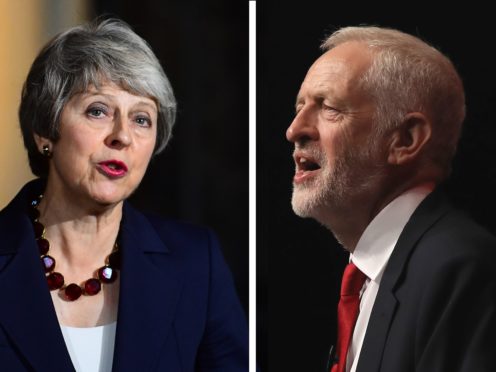Downing Street accused Jeremy Corbyn of “running scared” from a TV debate with Theresa May after the BBC dropped plans to host it.
The broadcaster said it was “disappointed” not to have reached an agreement on the proposal for a debate involving the two leaders, saying it wanted the programme to include other voices.
Labour and the Government had been at loggerheads over whether to accept the BBC proposal, which was favoured by Downing Street, or that of a straight head-to-head on ITV, which Mr Corbyn’s party prefers.
Downing Street blamed Labour for raising “false and flimsy objections” to the BBC’s proposed format.
But a senior Labour source said the party’s message to Mrs May was “come and join us on ITV”.
A debate between the party leaders had been pencilled in for December 9, just two days before MPs are due to vote on Mrs May’s Withdrawal Agreement.
In a statement, the BBC said: “We are disappointed that we could not reach an agreement on the BBC’s proposal for a debate on Brexit.
“We have been clear throughout the whole of this process that, as well as a substantive head-to-head debate, any programme we broadcast would need to include other voices, including other political parties, to reflect the wide range of views the public and parliamentarians hold about Brexit.
BBC statement on Brexit TV debate pic.twitter.com/An7ku4isse
— BBC News Press Team (@BBCNewsPR) December 4, 2018
“The final proposal we put to both of the main parties was for a head-to-head debate between the Prime Minister and the Leader of the Opposition, followed by a discussion between eight panellists, including politicians, with a wide range of views on Brexit, and ending with further head-to-head debate and closing statements.
“We believe ours was a fair and appropriate format for those taking part and, crucially, for our audiences around the country, and it is a shame we will not be able to bring them this programme.”
The BBC statement came hours after Labour said the corporation’s proposal was a “mishmash” with “a lopsided panel of other politicians and public figures, not a straightforward head-to-head debate”.
A Downing Street spokesman said: “The Prime Minister issued the original challenge to Jeremy Corbyn for a head-to-head debate, and despite her flexibility on timing and format, Jeremy Corbyn and Labour have done nothing but raise false and flimsy objections to the BBC’s proposal.
“There was a sensible and balanced proposal on the table but Jeremy Corbyn refused to take part.
“He is running scared of proper scrutiny, but we remain committed to holding a debate and will continue to press for a format that ensures a range of voices are heard alongside a substantial head to head.”
On Monday, the Prime Minister expressed concern that holding the debate on ITV would mean she missed Strictly Come Dancing.
Well, @jeremycorbyn may not want to miss the @imacelebrity final, but it’s all about @bbcstrictly for Prime Minister @theresa_may… #BBCorITV #Brexit pic.twitter.com/JxZJFRS8tq
— This Morning🎄 (@thismorning) December 3, 2018
Mr Corbyn last week complained on This Morning that the BBC’s proposal would clash with jungle-based reality show I’m A Celebrity, Get Me Out Of Here!
ITV stressed that “invitations remain open” to both Mrs May and Mr Corbyn to appear in a debate on the channel.
“As always, it is up to those invited to decide whether they want to accept the invitation,” a spokesman said.
Meanwhile, the Commons will consider calls led by Sky News for an independent commission to arrange leaders’ debates during general election campaigns.
A petition has been signed by more than 100,000 people calling for a commission to take decision-making out of the politicians’ and broadcasters’ hands and ensure TV debates become a regular fixture of UK elections.
The debate will take place on January 7, but the Government has already said TV showdowns are a matter for political parties and it has no plans to change electoral law to make them mandatory.
